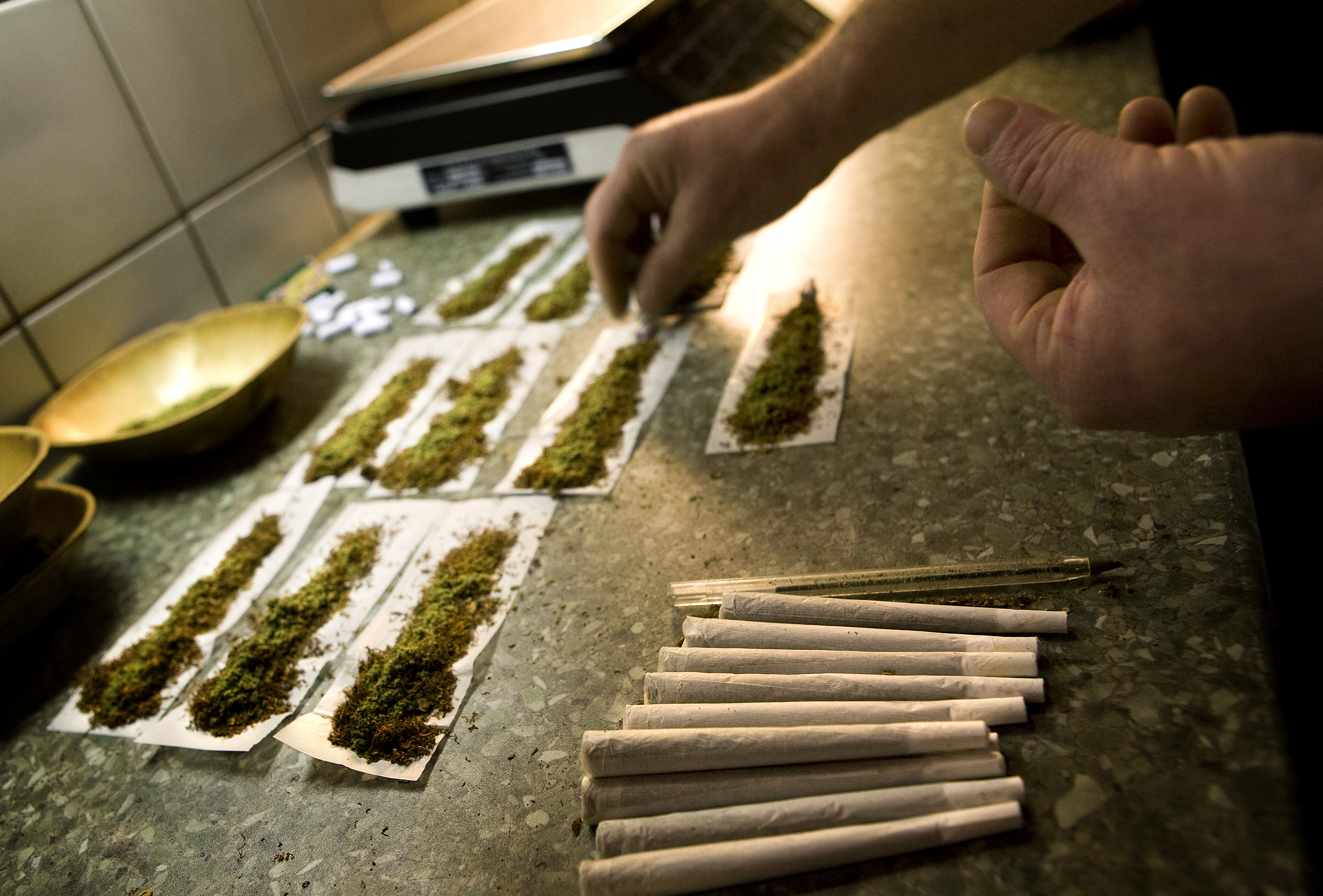Why pot legalization is also a fight for social justice
The illegality of pot has a long and ignominious history


A free daily email with the biggest news stories of the day – and the best features from TheWeek.com
You are now subscribed
Your newsletter sign-up was successful
I don't smoke pot. Or, more accurately, I haven't had the opportunity to smoke pot in time out of mind. But even when I did smoke pot, it was pretty rare. (Full disclosure: This statement does not apply to the six weeks of the 1991 Gulf War, during which time I was a resident of Tel Aviv and Saddam Hussein was firing missiles at my city. I think my roommate's and my soft drug use during those weeks can be fairly characterized as "medicinal.")
Of course, smoking pot is illegal — in most places, anyway, and certainly where I live now (Illinois' "Medical Cannabis Pilot Program" notwithstanding). Yet it should be noted that marijuana's legal status has only ever made me look-over-my-shoulder nervous about my very occasional use. It's never made me refrain.
This is because for as long as I can remember, I knew American pot policies were farcical. I can recall sitting in my high school auditorium for the "gateway drug" song-and-dance, and knowing that I was being lied to. This stuck me as sub-par planning on the adults' part.
The Week
Escape your echo chamber. Get the facts behind the news, plus analysis from multiple perspectives.

Sign up for The Week's Free Newsletters
From our morning news briefing to a weekly Good News Newsletter, get the best of The Week delivered directly to your inbox.
From our morning news briefing to a weekly Good News Newsletter, get the best of The Week delivered directly to your inbox.
Evidently, more and more Americans are coming to agree with Young Emily. CNN's Sanjay Gupta dove into the science in 2013 and famously recanted his long-standing anti-marijuana stance ("we have been terribly and systematically misled for nearly 70 years and I apologize for my own role in that"). President Obama has likened pot to alcohol, and recent polls show a steady shift in popular attitudes. Millennials favor legalization decisively — even Republicans.
As is generally true with culture-war issues, however, the movement toward sensible policy is slow and halting. We get dueling headlines like these, noted in The Washington Post: "Colorado sold 17 tons of retail marijuana in first legal year" vs. "Life in prison for selling $20 of weed." We get people like Pat Robertson rambling incoherently about God's will and enslavement to vegetables. We discover officials who think that if we raise marijuana legally, bunnies will become addicts.
All this even as millions of Americans drop their allegiance to the old conventional wisdom — not least, Washington, D.C., Police Chief Cathy Lanier. "All those [marijuana] arrests do is make people hate us," she said recently. "Marijuana smokers are not going to attack and kill a cop... Alcohol is a much bigger problem."
But for many on the pro-legalization side, there appears to be an important difference between weed and, say, marriage equality. One is a long-standing struggle for social justice; the other is just silly policy.
A free daily email with the biggest news stories of the day – and the best features from TheWeek.com
The immediate effect of this silly policy, however, has been that between bad science, business interests, fear-mongering, and ineptitude, we've been lying to our children and each other about pot for decades. And beyond that is the sheer racism involved.
American marijuana prohibition is rooted in white backlash to early 20th century Mexican immigrants, who brought cannabis use with them. Fear-mongering and Depression-era competition for jobs led to "a flurry of research," according to PBS's Frontline, "which linked the use of marijuana with violence, crime, and other socially deviant behaviors, primarily committed by ‘racially inferior' or underclass communities." Anti-pot laws soon followed.
Eighty or so years later, black and brown people are still disproportionately targeted by these laws. Study after study, report after report, shows that African Americans are far more likely, by several orders of magnitude, to be arrested and incarcerated for marijuana possession. "Three Strikes" provisions and mandatory sentencing mean that laws rooted in bigotry and buttressed by fiction are serving to shred and destabilize entire communities, every day.
When I talk to my kids about drugs, I tell them the truth: Molly, heroin, acid, etc., could ruin their lives, so they should give it all a pass. Prescription and OTC drugs carry dangers, too. I tell them I don't drink because our alcoholic family tree presents genetic risk. And I tell them that pot isn't all that bad (and alcohol actually is worse).
I also tell them that they probably shouldn't mess with any of it for the first 20 years of their lives. No drug is truly safe for the growing brain — and oh, yeah, weed's still illegal. That's not something you want to deal with before you can even vote.
Yet maintaining America's marijuana prohibition comes at a much higher price than awkward conversations with our kids. We're stripping our fellow citizens of their liberty based on ideas we know to be untrue, perpetuating and deepening a system of institutionalized racism that greets African-Americans at every turn. This, too, is something I need to be honest with my children about.
The struggle to legalize pot is about much more than marijuana's medical benefits or our penchant for bad Doritos jokes. It's about righting historic wrongs, and building a better legal system for all Americans. It's well past time to call for national legalization, even if you've never been high in your life.
Emily L. Hauser is a long-time commentary writer. Her work has appeared in a variety of outlets, including The Daily Beast, Haaretz, The Forward, Chicago Tribune, and The Dallas Morning News, where she has looked at a wide range of topics, from helmet laws to forgetfulness to the Israeli-Palestinian conflict.
-
 How the FCC’s ‘equal time’ rule works
How the FCC’s ‘equal time’ rule worksIn the Spotlight The law is at the heart of the Colbert-CBS conflict
-
 What is the endgame in the DHS shutdown?
What is the endgame in the DHS shutdown?Today’s Big Question Democrats want to rein in ICE’s immigration crackdown
-
 ‘Poor time management isn’t just an inconvenience’
‘Poor time management isn’t just an inconvenience’Instant Opinion Opinion, comment and editorials of the day
-
 The billionaires’ wealth tax: a catastrophe for California?
The billionaires’ wealth tax: a catastrophe for California?Talking Point Peter Thiel and Larry Page preparing to change state residency
-
 Bari Weiss’ ‘60 Minutes’ scandal is about more than one report
Bari Weiss’ ‘60 Minutes’ scandal is about more than one reportIN THE SPOTLIGHT By blocking an approved segment on a controversial prison holding US deportees in El Salvador, the editor-in-chief of CBS News has become the main story
-
 Has Zohran Mamdani shown the Democrats how to win again?
Has Zohran Mamdani shown the Democrats how to win again?Today’s Big Question New York City mayoral election touted as victory for left-wing populists but moderate centrist wins elsewhere present more complex path for Democratic Party
-
 Millions turn out for anti-Trump ‘No Kings’ rallies
Millions turn out for anti-Trump ‘No Kings’ ralliesSpeed Read An estimated 7 million people participated, 2 million more than at the first ‘No Kings’ protest in June
-
 Ghislaine Maxwell: angling for a Trump pardon
Ghislaine Maxwell: angling for a Trump pardonTalking Point Convicted sex trafficker's testimony could shed new light on president's links to Jeffrey Epstein
-
 The last words and final moments of 40 presidents
The last words and final moments of 40 presidentsThe Explainer Some are eloquent quotes worthy of the holders of the highest office in the nation, and others... aren't
-
 The JFK files: the truth at last?
The JFK files: the truth at last?In The Spotlight More than 64,000 previously classified documents relating the 1963 assassination of John F. Kennedy have been released by the Trump administration
-
 'Seriously, not literally': how should the world take Donald Trump?
'Seriously, not literally': how should the world take Donald Trump?Today's big question White House rhetoric and reality look likely to become increasingly blurred
